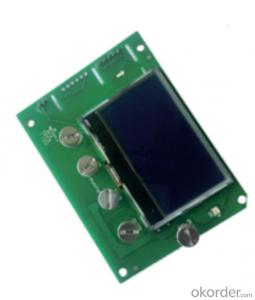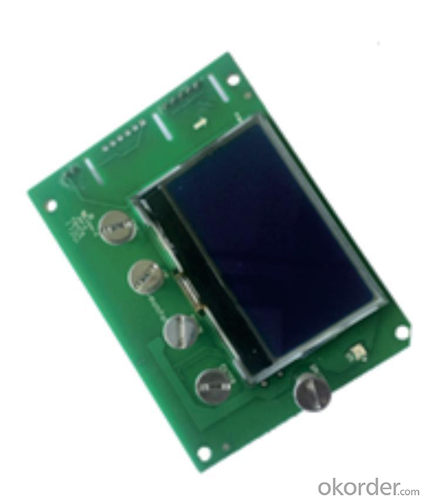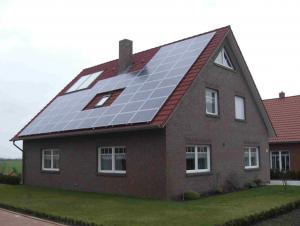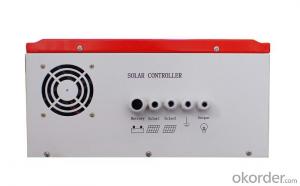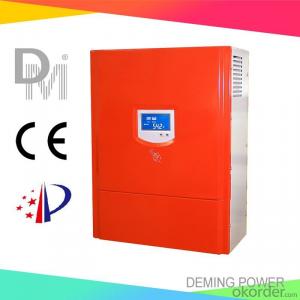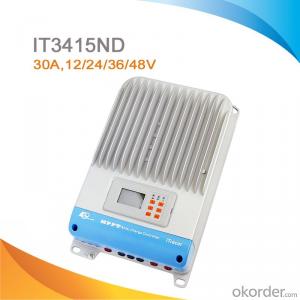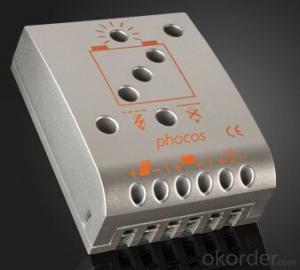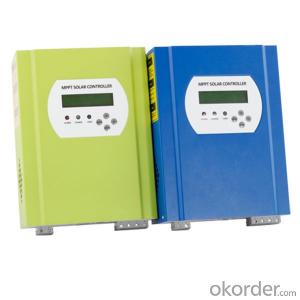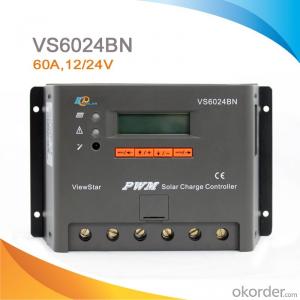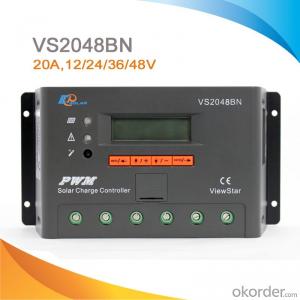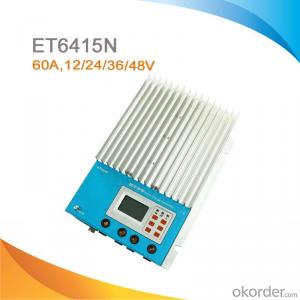Best MPPT Solar Charge Controllers - MCP-B Series Solar Energy Controller
- Loading Port:
- China main port
- Payment Terms:
- TT OR LC
- Min Order Qty:
- 100 pc
- Supply Capability:
- 5000 pc/month
OKorder Service Pledge
OKorder Financial Service
You Might Also Like
1. Product description
MCV-B series include the following series :MCV 20B and MCV 25B.
2. Product features
•Semiconductor devices adopt international famous brands such as IR, ST, and ON
•Ultra-high charging efficiency, significantly reducing product temperature rise
•IP68 protection level, no buttons, further improve waterproof reliability
•MPPT maximum power tracking algorithm can significantly improve the energy utilization
efficiency of photovoltaic system, which is 15%~30% higher than traditional PWM charging
efficiency.
•MPPT tracking efficiency up to 99.9%
•Maximum charging efficiency up to 98%
•Supports different types of batteries such as gel batteries, sealed batteries, open batteries,
lithium batteries, etc.
•No-load power consumption current <, 25mA (12V system), M 18mA (24V system)
•Infrared wireless communication, connected with computer, connected with handheld
remote control, convenient for engineering installation
•Battery and solar panel reverse connection protection
•Prevent night battery from discharging to solar panels
•Battery over-voltage protection
•Module overheat protection
•Load short circuit protection
3. Product size
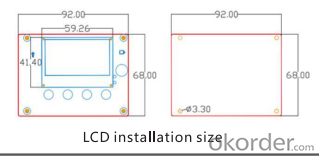
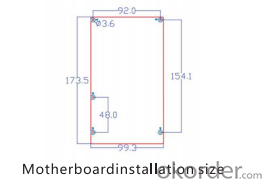
4. Technical Parameters
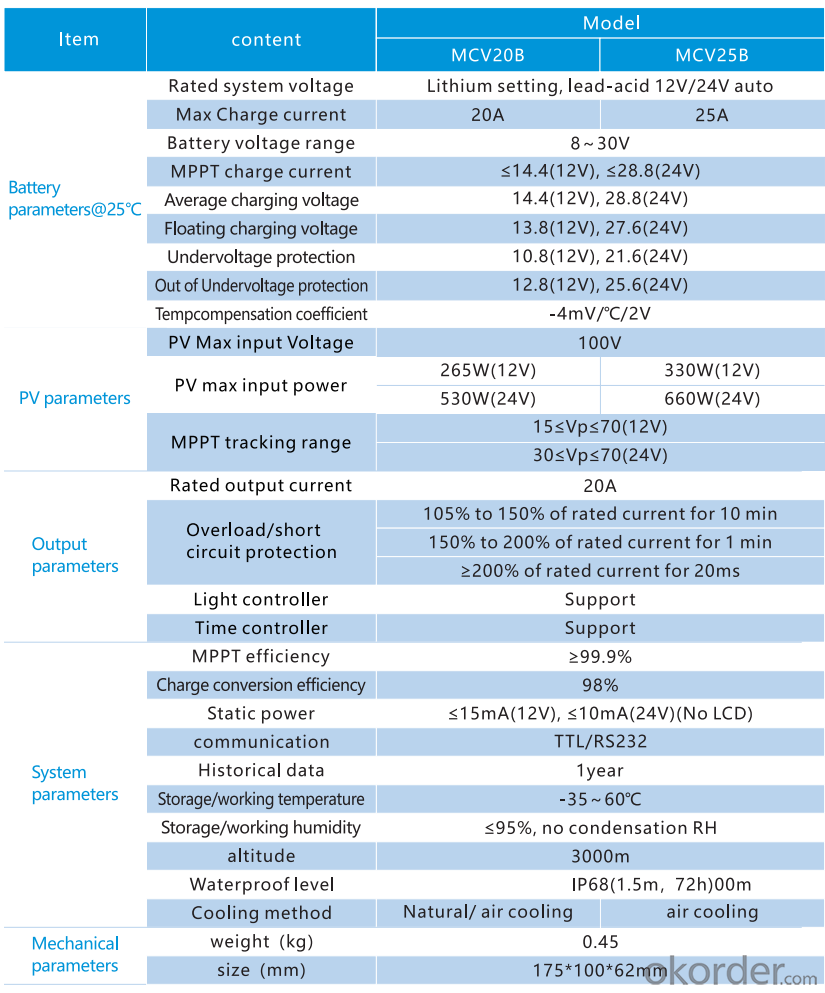
5. FAQ
Q: DO YOU HAVE ANY CERTIFICATION FOR YOUR PRODUCTS ?
A: We have ISO9001:2015,CE、RoHS certifications for all of our products.
Q: DO YOU HAVE MOQ FOR PLACE ORDER?
A: Low MOQ, 1pc for sample checking is available
- Q: What is the role of a solar controller in preventing over-discharge of batteries?
- The role of a solar controller in preventing over-discharge of batteries is to monitor the voltage level of the batteries and regulate the charging and discharging process. It ensures that the batteries are not drained beyond their safe operating range by disconnecting the load when the voltage drops to a certain threshold. This prevents over-discharge, which can lead to permanent damage or reduced lifespan of the batteries.
- Q: Can a solar controller be used with a solar-powered commercial building?
- Yes, a solar controller can be used with a solar-powered commercial building. A solar controller helps regulate and optimize the charging and discharging of batteries in a solar power system. It ensures that the energy generated by the solar panels is efficiently stored and managed, allowing for reliable and consistent power supply to the building.
- Q: What is the maximum warranty period of a solar controller?
- The maximum warranty period of a solar controller can vary depending on the manufacturer and the specific model. Generally, solar controllers come with warranty periods ranging from 1 to 5 years. However, some high-quality controllers may offer warranties of up to 10 years or more. It is important to check the product specifications and warranty information provided by the manufacturer to determine the exact maximum warranty period for a particular solar controller.
- Q: Can a solar controller be used in conjunction with a solar inverter?
- Yes, a solar controller can be used in conjunction with a solar inverter. A solar controller helps regulate and optimize the charging of the batteries connected to the solar system, while a solar inverter converts the DC power generated by the solar panels into AC power for use in homes or businesses. By working together, the solar controller and inverter ensure efficient and reliable operation of a solar power system.
- Q: Can a solar controller be used with a solar tracking system?
- Yes, a solar controller can be used with a solar tracking system. A solar controller is responsible for regulating the flow of energy between the solar panels and the batteries. It helps maintain the optimum charging voltage and prevents overcharging or discharging of the batteries. In a solar tracking system, the solar panels move to follow the sun's path throughout the day, maximizing energy generation. The solar controller ensures that the solar panels are efficiently charging the batteries regardless of their position.
- Q: Can a solar controller be used with solar-powered electric fences?
- Yes, a solar controller can be used with solar-powered electric fences. A solar controller is designed to regulate and optimize the charging of batteries in solar power systems, which can be utilized in solar-powered electric fences to ensure efficient energy storage and usage.
- Q: How does a solar controller prevent damage to solar panels?
- A solar controller prevents damage to solar panels by regulating the flow of electricity from the panels to the battery or grid. It prevents overcharging of the battery by monitoring the voltage and current levels, ensuring that the panels operate within their safe limits. Additionally, it protects the panels from reverse current flow during low light or night time conditions, which can cause damage to the cells.
- Q: What is the maximum current a solar controller can handle?
- The maximum current a solar controller can handle depends on its specifications and capacity. It varies from model to model, but generally, solar controllers can handle currents ranging from a few amps to several hundred amps.
- Q: Can a solar controller be used with solar panel arrays?
- Yes, a solar controller can be used with solar panel arrays. A solar controller regulates the charging and discharging of batteries connected to the solar panels, ensuring optimal performance and preventing overcharging or damage. Therefore, it is essential for managing the power generated by solar panel arrays and maximizing their efficiency.
- Q: What is the output voltage range of a solar controller?
- The output voltage range of a solar controller typically varies depending on the specific model and configuration. It can range from 12 volts to 48 volts, with some controllers having adjustable voltage settings within that range.
Send your message to us
Best MPPT Solar Charge Controllers - MCP-B Series Solar Energy Controller
- Loading Port:
- China main port
- Payment Terms:
- TT OR LC
- Min Order Qty:
- 100 pc
- Supply Capability:
- 5000 pc/month
OKorder Service Pledge
OKorder Financial Service
Similar products
Hot products
Hot Searches
Related keywords
